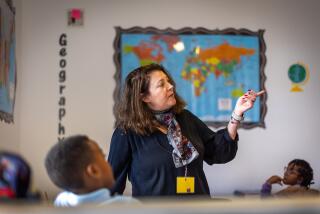You gotta have heart: Ways to inspire learning
Itâs easy to complain about the state of education these days. We read about low test scores, kids unprepared to pass high school proficiency exams, the number of college freshmen who need remedial help, the lack of funds available for the arts -- any number of areas are ripe for criticism. Amid the doom and gloom, though, there are people who work quietly to improve education, often one child at a time.
John Mightonâs âThe Myth of Abilityâ grew out of the authorâs struggles with math. Though he was drawn to the subject early on, he became disheartened when he didnât excel. âIt seemed clear, from everything I read, that a person born to do mathematics would never do badly on a test or struggle to learn a new [mathematical] concept.â
This misconception turned him off from studying advanced math until, at 28, the struggling playwright took a job as a math tutor, unsure if he could even do the job.
The experience changed his life. Working with underachieving kids, the Toronto resident found that when he told them he believed in their ability to learn, they rose to the occasion.
By breaking down the steps of any given math problem to its most basic forms and having the students repeat the steps as many times as necessary to feel comfortable, he helped even those whoâd been failing to master the concepts.
Inspired by his studentsâ progress, he applied the same techniques to himself and earned a doctorate in mathematics, developing along the way a math-tutoring program used in numerous Canadian public schools that puts these skills into practice. Much of the book outlines his formula for teaching math, taking readers through fractions, multiplication and division, ratios and percents and other concepts with worksheet-type materials.
In mathematics, more than any other subject, he tells us, âit is easy to turn a good student into a bad one in a very short time.â When children are confident they will not be allowed to fail, he shows us, amazing results occur.
âI Am a Pencilâ is a more ambitious book, offering insight into how children learn and how their minds may be expanded through literature, personal interaction and outings. Some years ago, childrenâs author Sam Swope (âThe Araboolies of Liberty Streetâ) was invited to give a 10-day creative writing workshop to a third-grade inner-city, ethnically diverse class in the New York City borough of Queens. He found the experience so enriching that he decided to continue as a volunteer, working with the same class for three years, through the end of fifth grade.
Swope introduces us to the kids through their writing, by their in-class behavior and via family members at parent-teacher conferences.
Thereâs Fatma, a gloomy Pakistani child who challenges Swope on the first day to guess her gender. (He guesses wrong.) She wants to be a writer, yet bristles around Swope, telling him at one point that she hates him.
Thereâs Miguel, a boy who draws violent pictures and is often the playground bully but who also wants desperately to do whatâs right. He is torn between his artistic self, who likes performing in the schoolâs plays, and his fatherâs condemnation of such activities as sinful.
Su Jung is an ever-so-quiet student whose mother abandoned her to return to Korea. Sometimes Su Jung seems to lose her ability to speak, suddenly going mute until the spell passes.
None of the kids has it easy, but under Swopeâs tutelage, their imaginations take flight. They write poems and stories, explore Central Park, write a book about trees, and learn about who they are and what they want out of life.
To Swopeâs credit, he never plays down the complexities of working with children. There are times when the kids donât want to learn, when the work seems more effort than itâs worth, when he knocks his head against the blackboard in frustration. Even after his three-year project ends and the kids have left him for middle school, he isnât exactly sure what, if anything, his efforts have amounted to.
But in the kidsâ ability to think critically, to write vividly, to imagine their way out of poverty and to visualize a world in which they are valued and belong, readers recognize the gift Swope has given.
More to Read
Sign up for our Book Club newsletter
Get the latest news, events and more from the Los Angeles Times Book Club, and help us get L.A. reading and talking.
You may occasionally receive promotional content from the Los Angeles Times.








